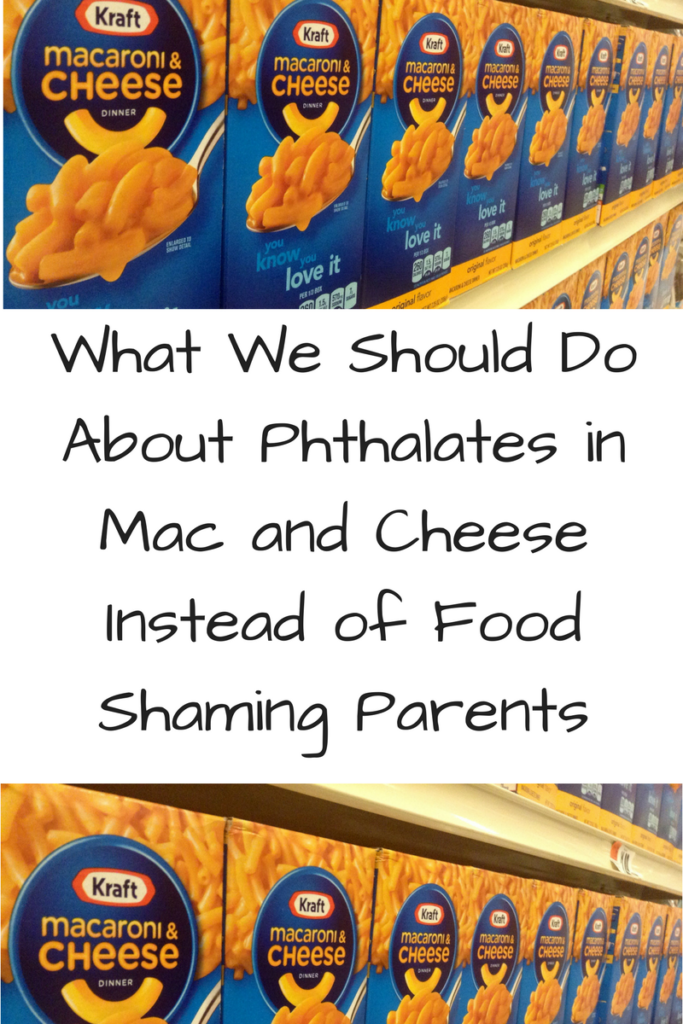
Photo courtesy of Mike Mozart on Flickr.
“So now we can’t eat mac and cheese. Is there anything we can feed our kids?!” That was the cry heard across the land from moms and dads who read the Scary Mommy or New York Times articles on phthalates in mac and cheese. Both of the articles are based on a report put out by a coalition of environmental groups concerned about toxic chemicals in processed food. (If you want to be super data-geeky, here’s the actual data.)
No doubt, the news is awful. Phthalates are genuinely nasty chemicals. They’re hormone disrupters, which could have effects on children’s growth, development, and brain chemistry, particularly boys. As both the scientific literature and the Consumer Safety Protection Commission point out, being exposed to phthalates in utero may contribute to reproductive and neurological issues in babies. It’s unclear how drastic these effects are in the small amounts available in most food, but they’re definitely not a positive influence. If this sounds familiar, companies use bisphenol A (BPA) for similar purposes in plastics. It also has similar effects. And the worst part is that it’s not just mac and cheese. Phthalates are in loads of food. That’s because food processing companies widely use them in packaging and equipment. There’s particularly high levels of phthalates in mac and cheese because they bind well to fat, like in cheese powder.
The Worst Way to Deal with Phthalates in Mac and Cheese
But telling parents to avoid boxed mac and cheese is exactly the worst way to deal with this problem. Even the New York Times article fell into this trap.
You know who uses boxed mac and cheese the most? Poor parents who want their kids to get maximum calories because they can’t afford fruits and vegetables. Working parents working one or even two jobs who don’t have time to make complex meals. Stay-at-home parents who can’t juggle anything complicated because the baby is crying. Parents whose kids are incredibly picky and it’s the only thing they’ll eat. Or parents who are just exhausted because small people are exhausting.
It shouldn’t be these parents’ responsibility to ensure the food industry isn’t poisoning our kids. After all, should it be parents’ responsibility to ensure that arsenic isn’t in our kids food? Yeah, I didn’t think so. While the food industry doesn’t need to use arsenic, they don’t need to use phthalates either. In fact, the U.S. already banned the use of several types of them in toys at levels higher than 0.1% in 2008. Europe doesn’t allow companies to use them equipment in contact with fatty foods or baby food. The U.S. Food and Drug Administration had agreed to consider removing approval of their use in food packaging and handling equipment, but never followed up.
The Action We Should Be Taking Instead
So instead of food shaming parents – whether intentionally or not – we should call for industry to remove phthalates from food packaging and equipment and government to regulate them. In 2014, a panel of experts acting on behalf of the U.S. Consumer Product Safety Commission actually recommended banning several more types of phthalates from toys and child care articles even though toys aren’t the main source of exposure. (The CPSC doesn’t have food in their mission space, so they wouldn’t have been able to comment on food.)
In fact, getting companies to be accountable was actually the whole point of the report. If you read the website, the public health organizations who issued it weren’t trying to scare the shit out of parents. They’re pushing to get Kraft and other corporations to stop using it. They hope public outrage will get these companies to take action, similar to how Nalgene and other water bottle companies stopped using BPA. If you’d like to contribute to that, you can sign their petition to Kraft or post on Kraft’s social media sites.
And this isn’t just about macaroni and cheese. Getting rid of phthalates would have a ripple effect, potentially leading companies to remove them from use in a variety of equipment. That would reduce children’s exposure overall. But that won’t happen if we just keep putting the responsibility on parents to avoid what’s a ubiquitous chemical.
Let’s not place the responsibility on the shoulders of individual parents. Instead, let’s take action and work together to make a safer, healthier world for all kids, including those who eat boxed macaroni and cheese.
The cross-section of environment and public health is an area I’m passionate about, although I usually focus on climate change. I’ve written about a Call to Action for Parents on Climate Change and Bringing My Kids to the People’s Climate March. For more parenting with a political twist, be sure to follow us on Facebook!
Amazing article! So insightful. Thank you for all of this information.
Thanks! I’m glad you got a lot out of it.
Great thoughts and helpful information! And here I thought I was in the clear because they stopped using artificial dyes in mac & cheese.
Thanks! And it’s always something, isn’t it? That’s why we need to keep these companies accountable.